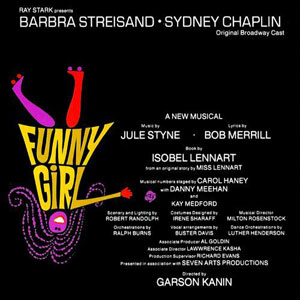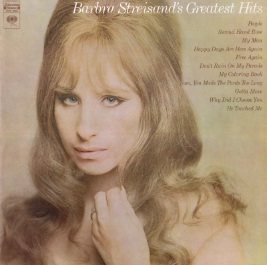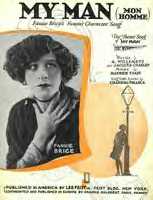Related Research Articles

Barbara Joan "Barbra" Streisand is an American singer, actress, and filmmaker. With a career spanning over six decades, she has achieved success in multiple fields of entertainment, and is among the few performers awarded an Emmy, Grammy, Oscar, and Tony (EGOT).

Funny Girl is a musical that opened on Broadway in 1964. The book was by Isobel Lennart, music by Jule Styne, and lyrics by Bob Merrill. The semi-biographical plot is based on the life and career of Broadway star, film actress and comedian Fanny Brice featuring her stormy relationship with entrepreneur and gambler Nick Arnstein. Its original title was My Man.

The Ziegfeld Follies was a series of elaborate theatrical revue productions on Broadway in New York City from 1907 to 1931, with renewals in 1934 and 1936. They became a radio program in 1932 and 1936 as The Ziegfeld Follies of the Air.

Fania Borach, known professionally as Fanny Brice or Fannie Brice, was an American comedienne, illustrated song model, singer, and theater and film actress who made many stage, radio, and film appearances. She is known as the creator and star of the top-rated radio comedy series The Baby Snooks Show.

Funny Lady is a 1975 American biographical musical comedy-drama film directed by Herbert Ross and starring Barbra Streisand, James Caan, Omar Sharif, Roddy McDowall and Ben Vereen.

"People" is a song composed by Jule Styne with lyrics by Bob Merrill for the 1964 Broadway musical Funny Girl starring Barbra Streisand, who introduced the song. The song was released as a single in 1964 with "I Am Woman", a solo version of "You Are Woman, I Am Man", also from Funny Girl.

"If You Were the Only Girl " is a popular song, written by Nat D. Ayer with lyrics by Clifford Grey. It was written for the musical revue The Bing Boys Are Here, which premièred on 19 April 1916 at the Alhambra Theatre in Leicester Square, London. The song was originally performed as a duet between Lucius Bing, played by George Robey, and his love interest Emma, originated by Violet Loraine.

The Barbra Streisand Album is the debut album by Barbra Streisand, released February 25, 1963, on Columbia Records, catalogue CL 2007 in mono and CS 8807 in stereo. It peaked at #8 on the Billboard pop albums chart, and has been certified a gold album by the RIAA. By 1966, the album had sold over one million copies worldwide.

Funny Girl is a 1968 American biographical musical comedy-drama film directed by William Wyler. The screenplay by Isobel Lennart was adapted from her book for the stage musical of the same title. It is loosely based on the life and career of Broadway and film star and comedian Fanny Brice and her stormy relationship with entrepreneur and gambler Nicky Arnstein.

Barbra Streisand's Greatest Hits is the first greatest hits album recorded by American vocalist Barbra Streisand. It was released on January 1, 1970, by Columbia Records. The record is a compilation consisting of 11 commercially successful singles from the singer's releases in the 1960s, with a majority of them being cover songs. The songs on Barbra Streisand's Greatest Hits originally appeared on one of the singer's eight previous albums and span in release from 1963 to 1968. It contains her most commercially successful tracks, including her first Billboard Hot 100 top ten single "People" and top 40 entry "Second Hand Rose". The album was distributed on compact disc in 1986 and rereleased under the title The Hits in 2006.

"Mon Homme" is a popular song also known by its English translation, "My Man". The song was originally composed by Maurice Yvain with French lyrics by Jacques-Charles and Albert Willemetz. The English lyrics were written by Channing Pollock.

"I'm Always Chasing Rainbows" is a popular Vaudeville song. The music is credited to Harry Carroll, but the melody is adapted from Fantaisie-Impromptu by Frédéric Chopin. The lyrics were written by Joseph McCarthy, and the song was published in 1917. It was introduced in the Broadway show Oh, Look! which opened in March 1918. The song was sung in the show by the Dolly Sisters. Judy Garland sang it in the 1941 film Ziegfeld Girl. It was subsequently sung by Jack Oakie in the 1944 film The Merry Monahans and was again featured in the 1945 film The Dolly Sisters, where it was sung by John Payne. It was also included for part of the run of the 1973 revival of Irene.

Diana Ross & the Supremes Sing and Perform "Funny Girl" is the thirteenth studio album released by Diana Ross & the Supremes on the Motown label, released in 1968. Berry Gordy had Diana Ross & the Supremes cover the songs from Barbra Streisand's Broadway musical Funny Girl original cast LP to tie-in with the September release of the feature-film version of the musical, also starring Streisand. The LP was not a success, and, with a Billboard 200 peak of 150, ranks as the lowest-charting of the Diana Ross-led Supremes albums.

Barbra Streisand...and Other Musical Instruments is the fourteenth studio album by American singer Barbra Streisand. It was released on November 2, 1973 by Columbia Records. The album was made available following a 1973 live television special promoted to improve Streisand's image and sound. With world music as the primary genre, the album's instrumentation varies greatly; even items such as kitchen utensils were used to create melodies and beats. With a majority of the songs on the album being cover songs, Streisand also re-recorded various tracks that originated earlier in her career. Her manager, Martin Erlichman, was credited as the album's sole and executive producer.
"I'm the Greatest Star" is a popular song from the 1964 musical Funny Girl. The show tune was composed by written by Jule Styne with lyrics by Bob Merrill. Barbra Streisand performed it in the role of Fanny Brice, first in the Broadway cast, then again in the 1968 film adaptation. The song was first included on the original Broadway cast recording album Funny Girl, which was a best-seller in 1964.

Funny Girl is the soundtrack album to the 1968 musical film of the same name, performed by its star Barbra Streisand. Released on the vinyl album format in stereo in 1968, the soundtrack was subsequently released in quadraphonic sound vinyl, cassette, and compact disc. The titles "Second Hand Rose" and "Exit Music" are omitted from the commercially released soundtrack editions. The soundtrack is featured in "Billboard Greatest albums of all time"., National Public Radio's "The Greatest Albums Made By Women"

"Second Hand Rose" is a 1921 popular song written by Grant Clarke and James F. Hanley for Fanny Brice.

"How Lucky Can You Get" is a song recorded by American vocalist Barbra Streisand for the official soundtrack to the 1975 film Funny Lady. It was released as a 7" single in April 1975 through Arista Records. The song was written by Fred Ebb and John Kander, while production was handled by Peter Matz. "How Lucky Can You Get" is one of the new songs on the soundtrack, with its origins coming from Fanny Brice, the character Streisand portrays in the aforementioned film. The music pertains to Brice herself, particularly the sarcastic nature of the lyrics that are accompanied by an "insistent" melody and production. It was suggested that the pattern of the lyrics may have been influenced by Giacomo Puccini's 1896 opera, La bohème.

Funny Lady is a soundtrack album by American singer Barbra Streisand. It was released by Arista Records on March 15, 1975 to promote the 1975 American musical comedy-drama film Funny Lady. Executively produced by Peter Matz, the fifteen tracks on the album were performed by Streisand, James Caan, and Ben Vereen. A soundtrack sequel to 1968's Funny Girl, Funny Lady is a collection of songs from the point of view of American performer Fanny Brice. "How Lucky Can You Get", the album's only single released in April 1975, promoted the record and was written by Fred Ebb and John Kander, who also co-wrote the majority of the songs on Funny Lady.

Funny Girl is the original Broadway cast recording of the musical Funny Girl, loosely based on the life of Fanny Brice: the show opened on March 26, 1964 at the Winter Garden Theater, starring Barbra Streisand. It is considered a Streisand album since she performed 12 out of its 17 tracks.
References
- 1 2 "Fanny Brice - I'd Rather Be Blue / If You Want The Rainbow (You Must Have The Rain) (Shellac) at Discogs". Discogs. Retrieved 2018-03-22.
- ↑ Herbert G. Goldman (October 1993). Fanny Brice: The Original Funny Girl . Oxford University Press. pp. 289–. ISBN 978-0-19-508552-5.
I'd Rather Be Blue.
- ↑ Colin Bratkovich (8 May 2014). Just Remember This. pp. 249–. ISBN 978-1-4836-4519-3.
- 1 2 Edwin M. Bradley (1 January 2004). The First Hollywood Musicals: A Critical Filmography of 171 Features, 1927 through 1932. McFarland. pp. 16–. ISBN 978-0-7864-2029-2.
- ↑ Stanley Green (1999). Hollywood Musicals Year by Year. Hal Leonard Corporation. pp. 244–. ISBN 978-0-634-00765-1.
- ↑ "I'd Rather Be Blue Over You (Than Happy With Somebody Else) Chart History (Adult Contemporary)". Billboard . Retrieved 2020-03-07.
- ↑ "Barbra Streisand - Funny Girl / I'd Rather Be Blue Over You (Than Happy With Somebody Else) at Discogs". Discogs. Retrieved 2018-03-22.
- ↑ "Barbra Streisand Chart History (Adult Contemporary)". Billboard.